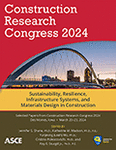Creating a Large-Scale National Residential Building Energy Dataset Using a Two-Stage Machine Learning Approach
Publication: Construction Research Congress 2024
ABSTRACT
Buildings account for 40% of total energy demand in the US. Consequently, there is a pressing need for a dataset that provides comprehensive information on the energy consumption of household units in the US. The current practice on large-scale energy simulations may not reflect the actual energy consumption patterns. Additionally, the existing national building energy datasets, such as the RECS, have a limited number of datapoint and do not reflect the social aspects of the households. This study aimed to create a large-scale national residential building energy dataset using a two-stage machine learning approach, combining two national datasets of the RECS and the AHS. The outcome of this study is a large-scale and comprehensive national dataset that contains information about energy consumption in household units as well as their detailed building features. Three machine learning algorithms, including artificial neural networks (ANN), random forest (RF), and gradient boosting regression (GBR), were used to develop a data-integration framework. The results showed that RF had the best performance in predicting the end-use energy consumption. Additionally, the predicted energy consumption in the generated large-scale dataset had an accuracy of over 80%. These findings have significant implications for energy-efficient building design and operation.
Get full access to this article
View all available purchase options and get full access to this chapter.
REFERENCES
Amasyali, K., and El-Gohary, N. M. (2018). “A review of data-driven building energy consumption prediction studies.” Renewable and Sustainable Energy Reviews.
Azadeh, A., Ghaderi, S. F., and Sohrabkhani, S. (2008). “Annual electricity consumption forecasting by neural network in high energy consuming industrial sectors.” Energy Conversion and Management, 49(8).
Becerik-Gerber, B., Siddiqui, M. K., Brilakis, I., El-Anwar, O., El-Gohary, N., Mahfouz, T., Jog, G. M., Li, S., and Kandil, A. A. (2014). “Civil Engineering Grand Challenges: Opportunities for Data Sensing, Information Analysis, and Knowledge Discovery.” Journal of Computing in Civil Engineering, 28(4).
Department of Energy United States of America. (2015). “An Assessment of Energy Technologies and Research Opportunities.” Chapter 5: Increasing Efficiency of Building Systems and Technologies, (September).
Esen, H., Esen, M., and Ozsolak, O. (2017). “Modelling and experimental performance analysis of solar-assisted ground source heat pump system.” Journal of Experimental and Theoretical Artificial Intelligence, 29(1).
Fumo, N., and Rafe Biswas, M. A. (2015). “Regression analysis for prediction of residential energy consumption.” Renewable and Sustainable Energy Reviews.
Gajowniczek, K., and Zabkowski, T. (2017). “Two-stage electricity demand modeling using machine learning algorithms.” Energies, 10(10).
Liu, Y., Chen, H., Zhang, L., Wu, X., and Wang, X. J. (2020). “Energy consumption prediction and diagnosis of public buildings based on support vector machine learning: A case study in China.” Journal of Cleaner Production, 272.
Manimurugan, S., Almutairi, S., Aborokbah, M. M., Narmatha, C., Ganesan, S., Chilamkurti, N., Alzaheb, R. A., and Almoamari, H. (2022). “Two-Stage Classification Model for the Prediction of Heart Disease Using IoMT and Artificial Intelligence.” Sensors, 22(2).
Mo, Y., Zhao, D., and Syal, M. (2019). “Effective Features to Predict Residential Energy Consumption Using Machine Learning.” Computing in Civil Engineering 2019: Smart Cities, Sustainability, and Resilience - Selected Papers from the ASCE International Conference on Computing in Civil Engineering 2019.
Nie, P., Roccotelli, M., Fanti, M. P., Ming, Z., and Li, Z. (2021). “Prediction of home energy consumption based on gradient boosting regression tree.” Energy Reports, 7.
Shams Amiri, S., Mueller, M., and Hoque, S. (2023). “Investigating the Application of a Commercial and Residential Energy Consumption Prediction Model for Urban Planning Scenarios with Machine Learning and Shapley Additive Explanation Methods.” Energy and Buildings.
Shapi, M. K. M., Ramli, N. A., and Awalin, L. J. (2021). “Energy consumption prediction by using machine learning for smart building: Case study in Malaysia.” Developments in the Built Environment, 5.
US Bureau of Labor Statistics. (n.d.). Average energy prices for the United States.
Wang, Z., Wang, Y., Zeng, R., Srinivasan, R. S., and Ahrentzen, S. (2018). “Random Forest based hourly building energy prediction.” Energy and Buildings, 171.
Xu, Y., Yang, C., Peng, S., and Nojima, Y. (2020). “A hybrid two-stage financial stock forecasting algorithm based on clustering and ensemble learning.” Applied Intelligence, 50(11).
Zhang, W., Robinson, C., Guhathakurta, S., Garikapati, V. M., Dilkina, B., Brown, M. A., and Pendyala, R. M. (2018). “Estimating residential energy consumption in metropolitan areas: A microsimulation approach.” Energy, 155.
Information & Authors
Information
Published In
History
Published online: Mar 18, 2024
Authors
Metrics & Citations
Metrics
Citations
Download citation
If you have the appropriate software installed, you can download article citation data to the citation manager of your choice. Simply select your manager software from the list below and click Download.
